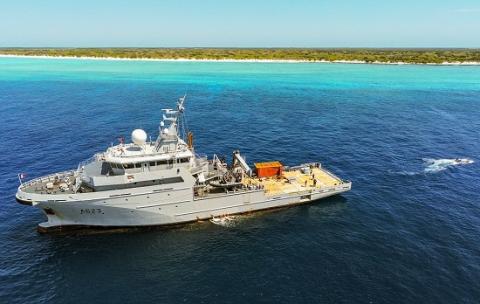
Bougainville Mission: "This mission represents a personal challenge and a unique adventure."
Émilie, who is passionate about plankton, talks about her academic career and her motivation for the Bougainville Mission. This adventure, combining scientific research and collaboration with the French Navy, represents an essential step in her career.
Émilie will be assigned to Tahiti along with Lucien.
Can you tell us about your background?
Émilie: I'm 23 years old, and I'm in my second year of a master's degree in Marine Sciences at Sorbonne University. Before that, I obtained a degree in Life Sciences, specializing in ecology.
During my studies, I also had the opportunity to join the university sports association's scuba diving club, an experience that has had a profound impact on my career. The combination of my training and diving raised my awareness of the importance of marine biodiversity and enabled me to discover the fascinating world of plankton. It was this awareness that fuelled my passion and guided my choice to continue my studies in this field.
What motivated you to apply for the Bougainville Mission and how did you discover this opportunity?
É.: I discovered the mission at the dedicated presentation meeting organized on the Jussieu campus.
My motivation for this experience stems directly from my passion for plankton! The participatory science aspect and raising public awareness of the crucial importance of plankton in marine ecosystems are particularly close to my heart. For me, this mission represents a personal challenge and a unique adventure.
The mission is being carried out in collaboration with the French Navy. What do you expect from this unique experience of working on board Navy ships?
É.: I'm looking forward to a very rewarding experience. I'm convinced that there will be a real exchange with the sailors: I'll have the opportunity to learn as much about their missions and their daily lives as they will about our scientific activities on board. It promises to be a great synergy!
How are you preparing to take on scientific responsibilities with full autonomy during the mission?
É.: We attended several scientific training courses in Banyuls-sur-Mer and Villefranche-sur-Mer, which enabled us to prepare ourselves as well as possible for the various tasks on board. These courses familiarized us with the use of sensors, data processing, contingency management and equipment installation and repair. We also learned how to harvest plankton and master the various associated manipulations.
At the same time, we exchanged ideas with former VOAs (Voluteer Officers in training) to anticipate potential difficulties and refine our protocols.
Finally, we received invaluable advice on scientific mediation, so as to be able to clearly explain to sailors the usefulness of each sensor and involve them in the collection process.
What challenges do you foresee during this mission and how do you plan to overcome them?
É.: Lucien and I are assigned to Papeete, on the BSAOM Bougainville, a real challenge as this is the mission's first year there. We'll have to organize everything on the spot and establish links to introduce the mission to the island communities we'll be calling on. Fortunately, we can count on the expertise of a Plankton Planet member and the invaluable advice of former VOA members to guide and support us.
How do you think this assignment will enrich your career and personal development?
É.: I'm looking forward to an exceptional experience, both scientifically and personally. This year in the field will enable me to put my knowledge into practice, while contributing to the development of participatory science. Exchanges with sailors and local populations will be a source of human and scientific enrichment. I'm convinced that this mission will give me new skills that will be useful throughout my career.
What skills do you hope to acquire or develop during this assignment?
É.: I'd like to develop my technical skills, particularly in the use of sensors in the marine environment and plankton taxonomy. I also intend to develop my autonomy and team management skills, as I'll be supervising operations in the field. Scientific mediation is also a skill I'm keen to acquire.
Have you ever thought about what you might do after Bougainville?
É.: Yes, I'm thinking of continuing with a thesis, ideally as an extension of the work done on this mission. If the opportunity arises, I'd like to continue contributing to this project after its completion.






